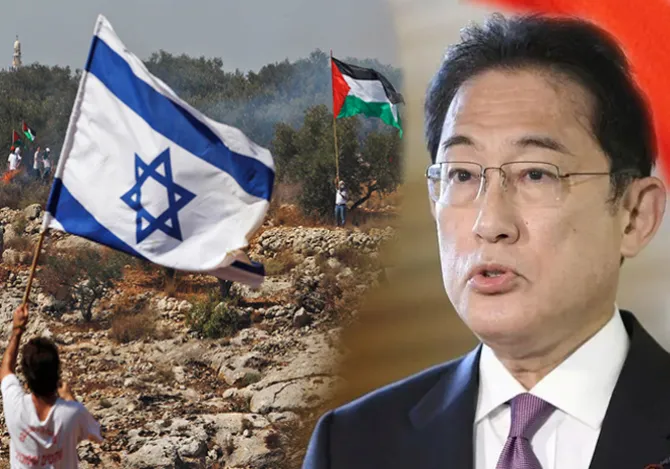
The recent Hamas attack on Israel, on 7 October 2023, marked an escalation in the conflict as the Palestinian militant group launched a coordinated surprise offensive against Israel. This conflict has had various international implications, including for Japan, which has a distinct approach to the Israel-Palestine issue compared to some of its G7 counterparts.
While other G7 governments immediately expressed that Israel had a “right to defend itself” following the Hamas attacks, Japan condemned the attacks but also expressed concern over the number of casualties in the Gaza Strip caused by the Israel Defense Forces' militarised response. This stance reflects Japan's longstanding policy approach towards the Israel-Palestine issue, where it has recognised the legitimacy of the Palestinian state since 1973. The escalating conflict tests Tokyo's policy, especially at a time when Japan is seeking a more active role in global leadership, as it holds the G7 presidency this year and is currently a non-permanent seat in the UN Security Council. The Middle East continues to remain an oil lifeline for Japan, supplying almost 90 percent of its needs, and, hence, any regional instability has a direct impact on Tokyo’s energy security. This explains why Japan initially articulated a comparatively neutral tone regarding the recent Israel-Palestine conflict.
The escalating conflict tests Tokyo's policy, especially at a time when Japan is seeking a more active role in global leadership, as it holds the G7 presidency this year and is currently a non-permanent seat in the UN Security Council.
Further implications arise from the broader geopolitical context. The Hamas attack's connection to other countries could potentially impact Japan's international relations. For instance, evidence suggests that some North Korean weapons were likely used by Hamas militants during their assault on Israel, despite Pyongyang's denials. Furthermore, the involvement of Iranian-backed terrorist organisations, such as Hamas and Palestinian Islamic Jihad (PIJ), underlines a broader network of geopolitical alliances and hostilities that could have ramifications for Japan, especially given its alliance with the United States (US) and its position in the broader East Asian security landscape.
Japan is a resource-poor country, lacking significant domestic energy reserves. Consequently, it is highly dependent on imports to meet its energy needs, making it vulnerable to disruptions in global energy markets. Japan has historically relied on a diverse portfolio of energy sources, including nuclear power, natural gas, and renewable energy. In recent years, there has been a concerted effort to reduce reliance on fossil fuels and nuclear energy due to environmental concerns and the Fukushima disaster in 2011. It has increased its reliance on liquefied natural gas (LNG) and invested in renewable energy. While in the short term, this diversification would help mitigate any potential disruption in oil supply, in the event of a prolonged conflict, disruptions in LNG supply routes or increased demand for LNG from other affected regions could put pressure on Japan's energy security. Particularly, any disruption in the oil and gas supply from the Middle East could compel Japan to re-evaluate and potentially adjust its energy mix, causing economic and strategic implications.
Japan has historically relied on a diverse portfolio of energy sources, including nuclear power, natural gas, and renewable energy.
Tokyo’s policy of maintaining a distance from political issues in other countries is a longstanding foreign policy tenet evident in the practice of seikei bunri (the art of “separating politics and economics”) (pre-1973) and comprehensive security (post-1973).
A brief history of Japan’s Israel policy
Japan's relationship with Israel has seen a trajectory of cautious engagement, influenced significantly by regional and global geopolitics. Following the end of World War II and amidst the restructuring of its foreign policy, Japan officially recognised the State of Israel in 1952. However, Japan's diplomatic engagement with Israel remained limited due to its heavy reliance on oil imports from Arab nations, who were adversarial towards Israel. The 1973 oil crisis, precipitated by the Yom Kippur War, underscored Japan's energy vulnerability and reinforced a cautious approach towards Israel to maintain good relations with oil-producing Arab countries. Despite the oil embargo, Japan took a step towards supporting Palestinian self-determination by recognising the Palestine Liberation Organization (PLO) in 1975, reflecting a nuanced approach to balance its interests in the Middle East.
Japan's relationship with Israel has seen a trajectory of cautious engagement, influenced significantly by regional and global geopolitics.
Over the decades, Japan's policy towards Israel and Palestine has aimed to promote peace and stability in the region. Japan has supported various peace initiatives and has often advocated for a two-state solution to the Israel-Palestine conflict. It has also provided financial aid and developmental assistance to the Palestinian territories, aiming to foster economic stability as a basis for peace. The turn of the century saw a gradual shift in Japan's approach towards Israel. With decreasing reliance on Middle Eastern oil and recognising Israel's burgeoning technology and innovation sector, Japan started fostering closer economic ties with Israel. Bilateral trade and investments grew, and high-level diplomatic visits between the two countries became more frequent. Japan also began to see Israel as a potential partner in addressing regional and global challenges, including counter-terrorism. In recent years, Japan has been pursuing a more balanced and active role in the Middle East, engaging with both Israeli and Palestinian leaders.
Diplomacy in neutrality
As the conflict unfolds, so do the narratives and information that are, on the one hand, flowing out of the region, and on the other, being shaped by the rest of the world. Earlier in October, soon after the conflict started, Israel’s ambassador to Japan cautioned Tokyo against Japanese aid given to Palestine being used as a tool by Hamas instead of it being used for developmental purposes. The continuation of the conflict has obligated Tokyo to assume a less reticent position while also maintaining its stand of urging both parties to de-escalate the conflict.
In the weeks following the attack, the State Minister for Foreign Affairs, Mr Horii Iwao, met with Mr Gilad Cohen, Ambassador Extraordinary and Plenipotentiary of the State of Israel, to express Japan’s solidarity with Israel, including Tel Aviv’s right to defend its territory and its people while also emphasising the severity of the humanitarian situation in Gaza. Foreign Minister, Yoko Kamikawa, is scheduled to visit Israel and Jordan in early November, which will also include meetings with leaders of the Palestinian Authority and seek the cooperation of both sides as well as Jordan in ensuring the safe return of Japanese nationals from the region as direct flights between Japan and Israel stand suspended.
Earlier in October, soon after the conflict started, Israel’s ambassador to Japan cautioned Tokyo against Japanese aid given to Palestine being used as a tool by Hamas instead of it being used for developmental purposes.
The ongoing war between Hamas and Israel, exacerbated by the recent attack, presents Japan with tough choices concerning its Middle East policy. The situation demands a delicate balance from Tokyo, as it navigates its relationships in the region alongside its broader international commitments and domestic political considerations.
Nevertheless, despite Japan’s largely neutral stance, there is perhaps potential to leverage the country’s diplomatic ties with countries in the region such as Saudi Arabia, the United Arab Emirates, and Iran to help create opportunities for dialogue to defuse the situation. Foreign Minister Kamikawa did indeed hold talks with her Iranian counterpart to play a role in resolving the crisis. However, the Israel-Palestine issue is arguably one of the most intricate political issues in the world, with each act of aggression by one side justifying retaliatory acts by the other. This cycle makes de-escalation and compromise immensely challenging, and perpetuates a state of hostility and mistrust. Japan's Israel-Palestine policy is crafted within this complex framework and is emblematic of the tightrope that nations often have to walk when dealing with deeply entrenched conflicts.
Pratnashree Basu is Associate Fellow at Observer Research Foundation.
The views expressed above belong to the author(s). ORF research and analyses now available on Telegram! Click here to access our curated content — blogs, longforms and interviews.




 PREV
PREV


